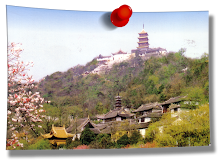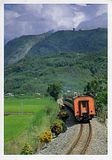

Leiden (in English and archaic Dutch also Leyden) is a city and municipality in the province of South Holland in the Netherlands and has 118.000 inhabitants. It forms a single urban area with Oegstgeest, Leiderdorp, Voorschoten, Valkenburg, Rijnsburg and Katwijk, with 254.000 inhabitants. It is located on the Old Rhine, close to the cities of The Hague and Haarlem. The recreational area of the Kaag Lakes (Kagerplassen) lies just to the northeast of Leiden.
Today Leiden forms an important part of Dutch history. The end of the Spanish siege in 1574 is celebrated on 3 October by an annual parade, a day off, a fair and eating the traditional food of herring and white bread and hutspot. However, the most important piece of Dutch history contributed by Leiden was the Constitution of the Netherlands. Johan Rudolf Thorbecke (1798–1872) wrote the Dutch Constitution in April 1848 in his house at Garenmarkt 9 in Leiden.
Leiden has important functions as a shopping and trade center for communities around the city. The University of Leiden is famous for its many developments including the famous Leyden jar, a capacitor made from a glass jar, invented in Leiden by Pieter van Musschenbroek in 1746. (It was actually first invented by Ewald Georg von Kleist in Germany the year before, but the name "Leyden jar" stuck.) Another development was in cryogenics: Heike Kamerlingh Onnes (1913 Nobel prize winner in physics) liquefied helium for the first time (1908) and later managed to reach a temperature of less than one degree above the absolute minimum. Albert Einstein also spent some time at Leiden University during his early to middle career.
The city also houses the Eurotransplant, the international organization responsible for the mediation and allocation of organ donation procedures in Austria, Belgium, Croatia, Germany, Luxembourg, the Netherlands and Slovenia.
Today Leiden forms an important part of Dutch history. The end of the Spanish siege in 1574 is celebrated on 3 October by an annual parade, a day off, a fair and eating the traditional food of herring and white bread and hutspot. However, the most important piece of Dutch history contributed by Leiden was the Constitution of the Netherlands. Johan Rudolf Thorbecke (1798–1872) wrote the Dutch Constitution in April 1848 in his house at Garenmarkt 9 in Leiden.
Leiden has important functions as a shopping and trade center for communities around the city. The University of Leiden is famous for its many developments including the famous Leyden jar, a capacitor made from a glass jar, invented in Leiden by Pieter van Musschenbroek in 1746. (It was actually first invented by Ewald Georg von Kleist in Germany the year before, but the name "Leyden jar" stuck.) Another development was in cryogenics: Heike Kamerlingh Onnes (1913 Nobel prize winner in physics) liquefied helium for the first time (1908) and later managed to reach a temperature of less than one degree above the absolute minimum. Albert Einstein also spent some time at Leiden University during his early to middle career.
The city also houses the Eurotransplant, the international organization responsible for the mediation and allocation of organ donation procedures in Austria, Belgium, Croatia, Germany, Luxembourg, the Netherlands and Slovenia.































No comments:
Post a Comment